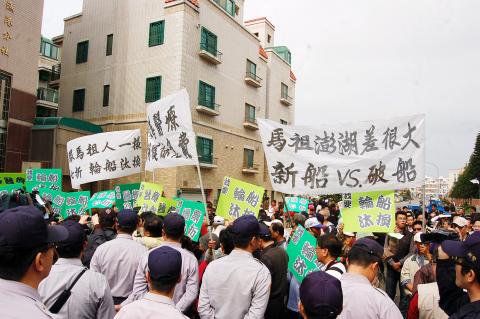On a one-day visit to Penghu, President Ma Ying-jeou (馬英九) yesterday was greeted by protesters who called for fairer treatment from the central government for travel expenses and medical coverage.
Accompanied by Democratic Progressive Party (DPP) county officials, about 100 local residents gathered outside the venue where Ma was having lunch with local dignitaries.
To shouts of “30 percent off [plane] tickets, improve medical care,” Penghu County Councilor Yang Yao (楊曜) of the DPP said Penghu residents could not keep quiet any longer.

PHOTO: LIU YU-CHING, TAIPEI TIMES
“We are taking to the streets because county commissioners, legislators and the president have turned a blind eye to our problems,” Yang said. “We are not asking much. We just want fair treatment.”
Shouting “Let’s use our ballots to support Penghu,” a female protester said Penghu had long been ignored by the central government, adding that Kinmen — another outlying island — has better benefits because it was where the Kinmen Brewery is located.
In response, Ma said his administration should be able to finalize a subsidy program for Taihwa Lun by April. Taihwa Lun is a shipping service partly subsidized by the government to carry passengers between Kaohsiung and Makung (馬公) in Penghu County.
On government subsidies for plane tickets, Ma said that at present the central government subsidizes 20 percent of travel costs, while the local governments, such as Penghu and Kinmen, cover an additional 10 percent.
However, local governments, which have been hit hard by the financial crisis, no longer had the finances to offer the 10 percent subsidy, Ma said.
Non-Partisan Solidarity Union Legislator Lin Pin-kun (林炳坤) is also planning to amend the Civil Aviation Act (民用航空法), Ma said, which would increase government subsidies for Penghu and Kinmen residents flying from certain airports from 20 percent to 30 percent.
Matsu residents receive subsidies of 30 percent and Penghu residents flying from certain airports as well as residents of Orchid Island (蘭嶼) and Green Island (綠島) receive 40 percent subsidies for air travel.
“Everyone concerned is still working to at least increase the subsidy to 30 percent,” Ma said.
Ma also reiterated his government’s resolve to develop Penghu into a low-carbon dioxide emitting island.
He said the Council for Economic Planning and Development had given the green light to the installation of submarine cables between Penghu and Taiwan proper, which would allow residents of Penghu to sell the extra power generated from wind turbines to the Taiwan Power Co.
ADDITIONAL REPORTING BY CNA

Alain Robert, known as the "French Spider-Man," praised Alex Honnold as exceptionally well-prepared after the US climber completed a free solo ascent of Taipei 101 yesterday. Robert said Honnold's ascent of the 508m-tall skyscraper in just more than one-and-a-half hours without using safety ropes or equipment was a remarkable achievement. "This is my life," he said in an interview conducted in French, adding that he liked the feeling of being "on the edge of danger." The 63-year-old Frenchman climbed Taipei 101 using ropes in December 2004, taking about four hours to reach the top. On a one-to-10 scale of difficulty, Robert said Taipei 101

Nipah virus infection is to be officially listed as a category 5 notifiable infectious disease in Taiwan in March, while clinical treatment guidelines are being formulated, the Centers for Disease Control (CDC) said yesterday. With Nipah infections being reported in other countries and considering its relatively high fatality rate, the centers on Jan. 16 announced that it would be listed as a notifiable infectious disease to bolster the nation’s systematic early warning system and increase public awareness, the CDC said. Bangladesh reported four fatal cases last year in separate districts, with three linked to raw date palm sap consumption, CDC Epidemic Intelligence

Taiwanese and US defense groups are collaborating to introduce deployable, semi-autonomous manufacturing systems for drones and components in a boost to the nation’s supply chain resilience. Taiwan’s G-Tech Optroelectronics Corp subsidiary GTOC and the US’ Aerkomm Inc on Friday announced an agreement with fellow US-based Firestorm Lab to adopt the latter’s xCell, a technology featuring 3D printers fitted in 6.1m container units. The systems enable aerial platforms and parts to be produced in high volumes from dispersed nodes capable of rapid redeployment, to minimize the risk of enemy strikes and to meet field requirements, they said. Firestorm chief technology officer Ian Muceus said

MORE FALL: An investigation into one of Xi’s key cronies, part of a broader ‘anti-corruption’ drive, indicates that he might have a deep distrust in the military, an expert said China’s latest military purge underscores systemic risks in its shift from collective leadership to sole rule under Chinese President Xi Jinping (習近平), and could disrupt its chain of command and military capabilities, a national security official said yesterday. If decisionmaking within the Chinese Communist Party has become “irrational” under one-man rule, the Taiwan Strait and the regional situation must be approached with extreme caution, given unforeseen risks, they added. The anonymous official made the remarks as China’s Central Military Commission Vice Chairman Zhang Youxia (張又俠) and Joint Staff Department Chief of Staff Liu Zhenli (劉振立) were reportedly being investigated for suspected “serious